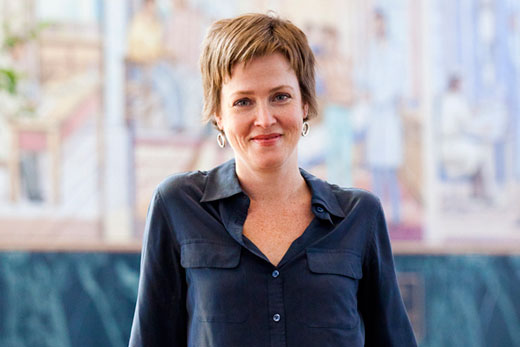It was a Thanksgiving dinner argument that motivated Stacia Brown, Emory's director of development for clinical programs, to pen her first historical fiction novel, "Accidents of Providence" (Houghton Mifflin Harcourt, 2012).
Brown was attending a potluck at a friend's house when one of the guests, a psychologist, began grilling Brown about her plans to write a book set in 17th century England.
"Immediately, she urged me to quit the habit," remembers Brown. "She swore that any fictional attempt to depict a working-class 17th century woman was doomed to failure because women of that era did not have inner lives or the time to contemplate their world. They did not have the luxury to be complicated."
The psychologist won the argument, but Brown was determined to write a story about an ordinary tradeswoman condemned to death for secretly burying her illegitimate newborn in Cromwell's England.
Brown will discuss and sign the book at the Barnes & Noble Bookstore at Emory on Feb. 8 at 6 p.m.
Brown's more than 12-year association with Emory began as a Woodruff Fellow at Candler School of Theology, where she completed her master's of divinity in 1998. She later earned her PhD in the Graduate Division of Religion. Her on-campus experience has included a side job at Emory Catering, writing for Emory Report, programmatic positions at the Center for Ethics, and a five-year stint in the Office of the Senior Vice Provost for Academic Affairs, where she eventually became director of programs.
Since July, Brown has served as a major gifts officer for clinical programs in the School of Medicine, including Radiology and Imaging Sciences, Emergency Medicine, Dermatology, Anesthesiology and other departments. She recently talked with Emory Report.
What are some of your major job responsibilities?
I work with clinical departments to incorporate philanthropy into their strategic plans and into their faculty and physician training. It has been a big learning curve to shift from the university side to the health sciences side of Emory, but I am an explorer by nature so I am having the time of my life.
How have your various professional experiences enriched your development?
Right after college, I worked at several different homeless shelters in San Francisco for more than a year. One of them was a "wet" shelter and the other was a "dry" shelter. The wet shelter allowed people to stay there if they showed up intoxicated and the other shelter did not. Both places were very challenging. Homeless folks are living in a pressure cooker 24-7. The main thing separating them from the rest of us is that they don't have a house or apartment in which to hide their problems from the rest of the world. And they don't have a safety net. I also have learned a great deal from the multiple roles I have held at Emory. I have been exposed to virtually every side of this university over the years.
What inspired you to write "Accidents of Providence?"
I began writing the book in 2006 just after finishing the final draft of my dissertation. I wanted to do something totally different, outside of my area of expertise. At the same time, I had all this research piled up from my dissertation. I wanted to explore the moral consequences of inaction as well as action. The consequences of waiting too long — to do something, to become something, to say something — can be disastrous. But we all have been in such situations. You wait too long for that perfect person, that ideal mate. You wait too long to put an offer on the house. You wait too long to pursue a dream and suddenly you can't travel anymore, you can't afford to go back to school. You wait too long to apologize and suddenly a relationship that mattered is irreparably damaged. I'm interested in how lives are changed by waiting, by hesitation, by those moments when we think we should do something but we don't.
How difficult was the research process?
I had a general foundation in the intellectual history of the period, but I had to start digging into the histories of fashion, social matters, style and taste. I had to figure out where people got their drinking water. Where did they relieve themselves? The story of my main character, Rachel Lockyer, is fictional but it borrows from real events. I wanted to explore what life was like for ordinary women — not queens or duchesses or countesses — during the years of the English civil war. Today, we live in such a tell-all, confessional society that we have almost forgotten what it feels like to stay silent, to ponder something difficult or personal in private. "Accidents of Providence" tries to explore what is both gained and lost when a person chooses to remain silent at a critical moment.
What is your next writing project?
I am finishing work on my second novel, "The Year of Ought." It's about an evangelical missionary in San Francisco in the year 1900 who accidentally marries the wrong sister. It is scheduled to be published in 2013, which means I better get busy.

